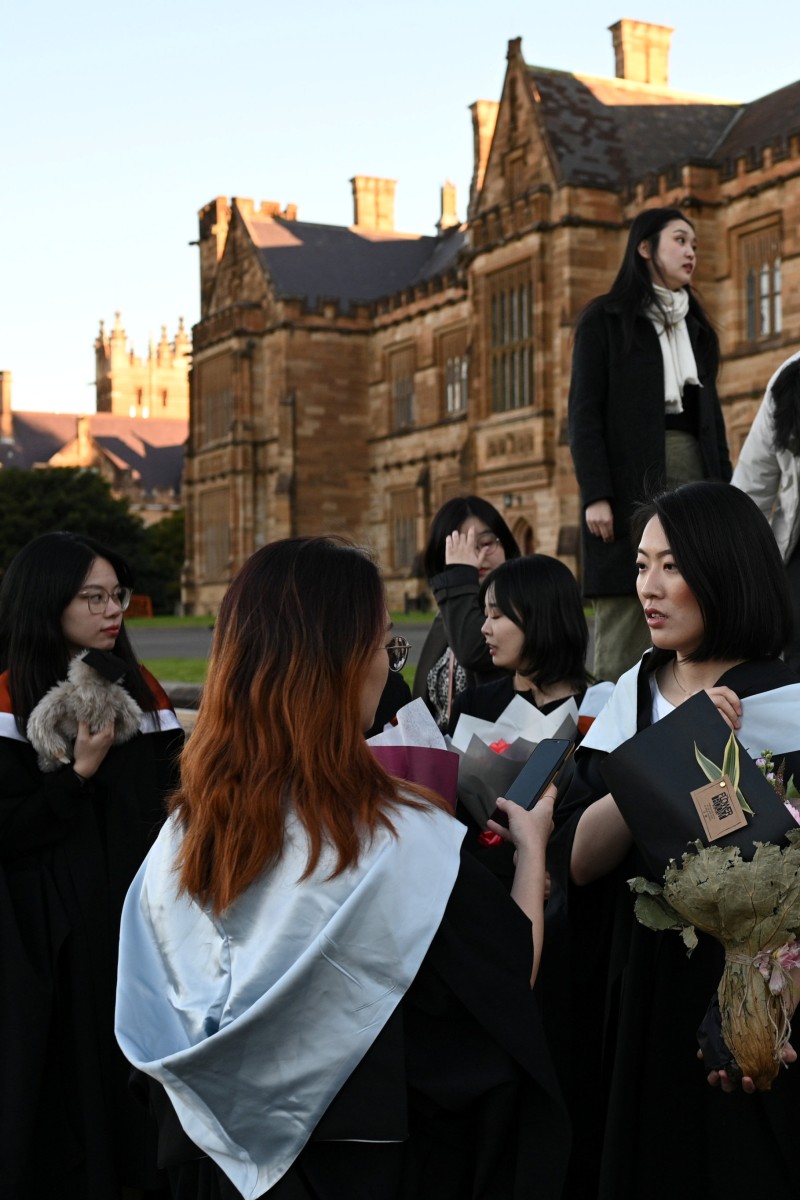
The Lens: Australia must consider economic impact of capping foreign student enrolment
Check out this student’s response to Australia’s policy shift on migration; then, read next week’s news snippet and submit your thoughts
 Graduates take pictures around the University of Sydney campus. Photo: Reuters
Graduates take pictures around the University of Sydney campus. Photo: ReutersNext week’s topic is about an Indian state’s plan to recruit transgender traffic volunteers. Read more about this issue at the bottom of the page, and send us your response by filling out this form or emailing [email protected] by October 1 at 12pm.
Thoughts from last week
Vijay Narayanan, 16, Island School
The Australian government recently announced its intention to limit the enrolment of international students to a maximum of 270,000.
The consequences of such policy changes and social shifts are threefold, with the first being the potential economic impact on higher education institutions.
The international education industry, which accounts for 2.5 per cent of Australia’s GDP, is a significant revenue generator for the country’s universities.
A reduction in enrolment could lead to cumulative losses of US$9.5 billion (HK$73.9 billion) in the next three years, triggering a chain reaction of decreased tuition costs, reduced spending on cutting-edge facilities and fewer applicants.
The resulting financial strain may force universities to implement budget cuts that could affect funding for on-campus research and student services.
The proposed policy could also have significant impacts on the Australian labour market. Multinational corporations and tech giants such as Google, Apple and Nvidia often seek to hire from a diverse talent pool to drive innovation. They may reconsider their presence in Australia if the international student population decreases.
This could lead to structural shifts in the labour market and potential mismatches between company demands and available talent in knowledge-based fields.
Increased migration levels are a double-edged sword for countries. On one hand, they can exacerbate existing problems within a nation’s economy. However, the economic potential of skilled international workers and students is unmatched.
The Australian government should be aware of the potential economic roadblocks caused by a growing populace and the need to retain the nation’s role as a popular migrant destination.
Check out last week’s news snippet
Read and observe
In a groundbreaking move for social welfare in India, the southern state of Telangana has announced a plan to recruit transgender people as volunteer traffic police.
As one of the most marginalised groups in a largely conservative society, transgender individuals are often forced to sustain themselves by begging at traffic lights or seeking handouts from motorists.
Revanth Reddy, the chief minister of Telangana, has tasked senior traffic authorities with gauging the transgender community’s willingness to take on this role. The plan includes training around 3,000 individuals over 10 days and equipping them with specially designed uniforms.
In the coming months, about 1,000 will be deployed in the state’s capital of Hyderabad.
Trans rights activists’ support for the initiative is tempered by caution, as they emphasise the need for careful planning.
Current societal conditions often force transgender people into underground lifestyles marked by discrimination and limited job opportunities.
Public heckling and harassment of transgender people are common in rural areas. They often have difficulties securing housing, and many resort to sex work or begging to survive.
Deedee, a transwoman and member of the Trans Rights Now Collective, argued that if Telangana truly aimed for inclusivity, it should offer employment across all levels of the police force.
Some corporations have begun to hire transgender individuals in India, though the numbers remain low in a country of 1.4 billion.
Advocates say that for programmes like the traffic regulator initiative in Telangana to truly succeed, genuine engagement with the transgender community is needed.
Staff writers
Research and discuss
-
Do you think this strategy will effectively help transgender people in Telangana? What are some other potential outcomes of this initiative?
-
What do you think about Deedee’s thoughts about the initiative? What are some other ways the government could help?
